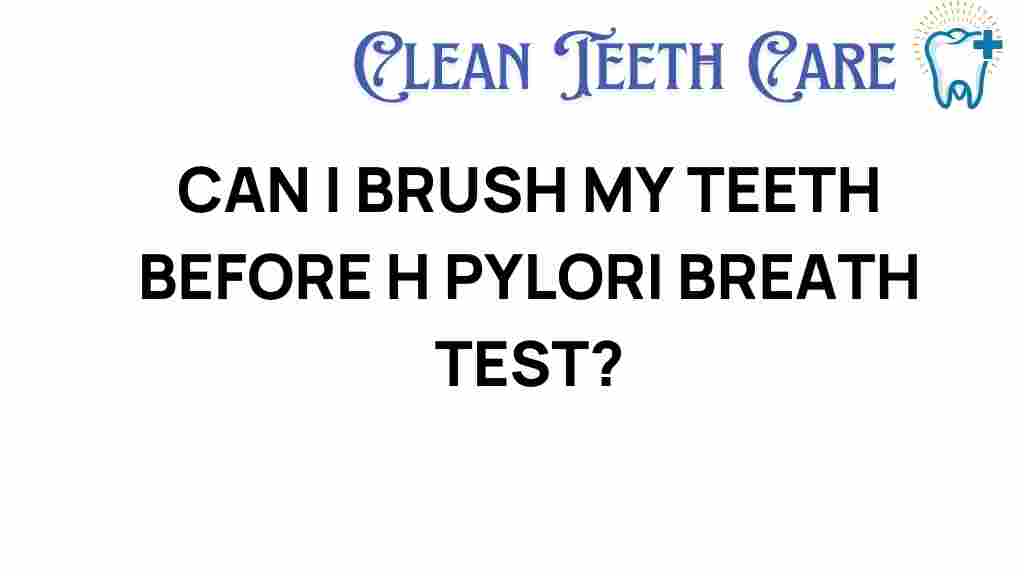The Surprising Impact of Brushing Teeth on Your H. Pylori Breath Test
When it comes to maintaining good health, dental hygiene is often overlooked. However, did you know that your oral health can significantly affect the results of your H. Pylori breath test? This article explores the connection between dental hygiene and the accuracy of H. Pylori testing, the implications for stomach health, and essential patient preparation guidelines.
Understanding H. Pylori and Its Impact on Health
H. Pylori, or Helicobacter pylori, is a type of bacteria that infects the stomach lining. It is a common cause of peptic ulcers and can lead to more severe gastrointestinal issues if left untreated. Understanding the importance of accurate testing for H. Pylori is crucial for effective treatment and maintaining stomach health.
What is an H. Pylori Breath Test?
The H. Pylori breath test is a non-invasive method used to detect the presence of this bacteria in the stomach. The test measures the amount of carbon dioxide in your breath after you consume a special substance containing urea. If H. Pylori is present, it will break down the urea, leading to an increase in labeled carbon dioxide in your breath.
The Importance of Dental Hygiene
Dental hygiene plays a vital role in overall health, including how your body interacts with various bacteria. Poor oral hygiene can lead to an overgrowth of bacteria in the mouth, which can influence the results of your H. Pylori breath test.
How Dental Hygiene Affects Testing Accuracy
The relationship between dental hygiene and the accuracy of the H. Pylori breath test can be surprising. Here’s how:
- Bacterial Contamination: If your mouth is not clean, the bacteria present can contaminate your breath sample, leading to inaccurate results.
- Oral Bacteria Interaction: The presence of other oral bacteria can interfere with the breakdown of urea, affecting the test’s outcome.
- Inflammation and Infection: Gum disease or other oral infections may also influence how your body reacts to the test substance.
Patient Preparation for the H. Pylori Breath Test
Proper preparation is crucial for ensuring the accuracy of your H. Pylori breath test. Here’s a step-by-step guide to prepare effectively:
1. Maintain Good Oral Hygiene
Before your test, it is essential to practice thorough dental hygiene:
- Brush your teeth at least twice a day.
- Floss daily to remove food particles and plaque between teeth.
- Consider using an antibacterial mouthwash to reduce oral bacteria.
2. Follow Medical Guidelines
Adhering to medical guidelines can greatly enhance the accuracy of your test:
- Avoid antibiotics, bismuth, or proton pump inhibitors for at least two weeks before the test, as these can affect the results.
- Do not consume any food or drink for at least 6 hours before the test. This includes avoiding coffee, gum, and mints, which can introduce additional bacteria into your mouth.
3. Discuss Medications with Your Doctor
Before the test, consult with your healthcare provider about any medications you are taking. Some medications can affect the test results, so it’s crucial to have a clear understanding of what to avoid.
4. Arrive Prepared and Informed
On the day of your test, arrive at the clinic with a clear understanding of the process. Ask any questions you may have to ensure you are fully informed.
Troubleshooting Common Issues
Even with proper preparation, there may be factors that can lead to inconclusive or inaccurate results. Here are some common issues and troubleshooting tips:
1. Inconsistent Results
If you receive inconsistent results, it may be due to residual food or bacteria affecting the breath sample. To avoid this, ensure you follow the fasting guidelines strictly.
2. Previous Antibiotic Use
If you have taken antibiotics recently, this can impact the presence of H. Pylori. Discuss this with your doctor, as they may recommend waiting a few weeks before testing again.
3. Oral Health Issues
If you have ongoing oral health issues (like gum disease or tooth decay), these can affect your breath test results. Make sure to address any dental problems prior to your test.
Conclusion
The impact of brushing teeth on your H. Pylori breath test is more significant than many realize. Maintaining good dental hygiene not only promotes overall oral health but also plays a critical role in the accuracy of your breath test results. By following proper patient preparation guidelines and understanding the relationship between bacteria in your mouth and your stomach health, you can achieve more reliable testing outcomes.
For more information on maintaining oral health and its impact on overall well-being, visit this resource.
By taking the time to care for your teeth and gums, you are not just taking care of your mouth; you are also contributing to your stomach health and ensuring that your medical tests are as accurate as possible. Remember, a healthy mouth leads to a healthy body.
This article is in the category Conditions and created by CleanTeethCare Team
